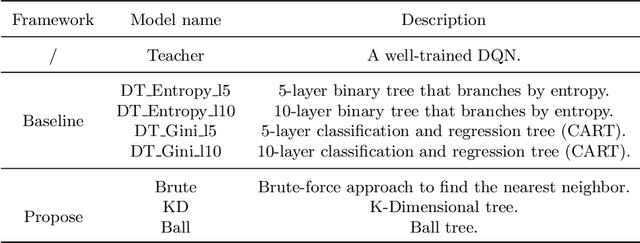Keeping Minimal Experience to Achieve Efficient Interpretable Policy Distillation
Paper and Code
Mar 02, 2022



Although deep reinforcement learning has become a universal solution for complex control tasks, its real-world applicability is still limited because lacking security guarantees for policies. To address this problem, we propose Boundary Characterization via the Minimum Experience Retention (BCMER), an end-to-end Interpretable Policy Distillation (IPD) framework. Unlike previous IPD approaches, BCMER distinguishes the importance of experiences and keeps a minimal but critical experience pool with almost no loss of policy similarity. Specifically, the proposed BCMER contains two basic steps. Firstly, we propose a novel multidimensional hyperspheres intersection (MHI) approach to divide experience points into boundary points and internal points, and reserve the crucial boundary points. Secondly, we develop a nearest-neighbor-based model to generate robust and interpretable decision rules based on the boundary points. Extensive experiments show that the proposed BCMER is able to reduce the amount of experience to 1.4%~19.1% (when the count of the naive experiences is 10k) and maintain high IPD performance. In general, the proposed BCMER is more suitable for the experience storage limited regime because it discovers the critical experience and eliminates redundant experience.
 Add to Chrome
Add to Chrome Add to Firefox
Add to Firefox Add to Edge
Add to Edge